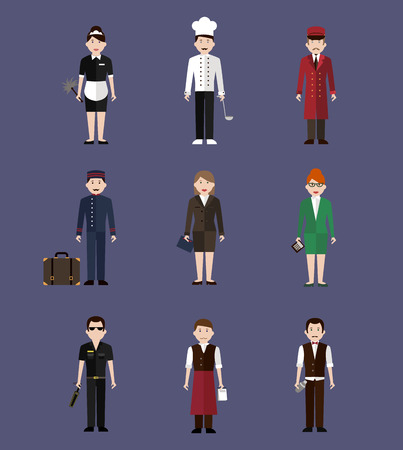Hospitality basics
Hospitality is often overlooked and undervalued as a career path. It’s often demanding, given that it not only serves people at lunchtime but the people who are involved in the industry are often hard at work when standard office workers are at play or spending their leisure time. Bar, Restaurants are often welcoming people at the end of the working day and they rely not only on a flexible workforce to provide the run of the mill functions…meeting, greeting, pulling pints and setting up meeting rooms for off-site training and team building for example but also highly trained and motivated staff who understand the supply chain and ingredients that result in glasses or plates of wine being served. As banal as it sometimes is seen as too, the Health and Safety aspects of these businesses are often blended seamlessly into the functions performed but a working knowledge of these is vital in order to protect the public both in public spaces and in terms of the hygiene of the surroundings that Hospitality services are provided in.
There is often not the same level of scrutiny of school and college results that those in other industries face as the first point of differentiation for potential job positions. In fact quite a lot of what’s required in the Hospitality industry goes counter to the teaching environment that Hospitality workers will have experienced in school. Enthusiasm, drive, determination, the ability to think on your feet and solve practical problems, and a pleasant demeanour are not really qualities that will be measured in the classroom. However they maybe some of the skills and personality traits that customers value when dealing with people in hospitality industry.

Big Names in the Hospitality Sector
There are many solid employers that can provide the first step on the ladder to learning the basics of serving the public and understanding the wider industry knowledge that will be valuable in trying to develop a career in the sector. Compass Group for example employees over 60,000 people in various roles as one of the largest operators of food and drink solutions to businesses (think staff canteens, events etc.) and event organisers. JDWeatherspoon were established less than forty years ago and already operate almost 1,000 pubs across the UK employing 35,000 staff. Subway recently passed McDonalds as the number one food franchise in the UK and currently employ well in excess of 100,000 staff overseas from their original US base, and Pret a Manger with 360 outlets, over 100 different nationalities working for them and having already been successful enough for Coca-Cola to buy into the business show that being based in or starting a food, drink or hospitality business in the UK does not have to be traditionally British to succeed. An article written for the Guardian show just what goes into tutoring and preparing staff to work in a Pret outlet…
Many new ethnic food are changing the way we eat – Just Falafel, Wahaca, Wagamama, Itsu to name but a few. Whether you are working in a bar that serves food, a restaurant, a hotel, or thinking of opening your own Food outlet you need to be quite sure of the Hygiene requirements that re required of you. Ealing Council in West London summarise the requirements as follows:
‘All food operators have a legal duty to ensure that the food that they produce is safe to eat, of an acceptable quality and is properly labelled. They must also protect the public and their staff from any hazards that may arise from their operations. The food safety team works with local traders to ensure that these standards are met and use enforcement powers to protect the public when necessary.‘
Food Hygiene Rating Scheme
These standards are very much enforced – food standards officers can visit any premises without prior appointment. In addition to checking that the business visited complies with hygiene standards, the officers can also check that the food served matches the descriptions provided in the Food outlets marketing materials, posters and menus. Most Food outlets serving the public will be covered by the Food Hygiene Rating Scheme. This means that when a business is inspected, it is given a hygiene rating from ‘0’ at the bottom to ‘5’ at the top, based on the hygiene standards found at the time. As well as being given a sticker/certificate with the rating (these can be put on display to show customers how good your hygiene standards are) the ratings can also be able seen on the Food Standards Agency’s website.
The health and safety aspect is one of the most important in ensuring that the reputation of a business in this sector remains solid. EU legislation has had its say too in the standards that are required particularly with regard to Food Intolerances – from December 2014, the EU Food Information for Consumers Regulation requires food businesses to provide allergy information on food sold unpackaged, in for example catering outlets, deli counters, bakeries and sandwich bars. So what seems like a simple task of pouring a cup of coffee or making a sandwich is in fact a highly regulated and scrutinised work environment and understanding these requirements will help you and those who work around you operate within an environment that is both service and hygiene compliant.
Are you interested in any of the above, or just want to find out a little more?
Call us now, regarding these services in the London area and how we can help, on 020 8108 0090or complete the enquiry form and we will call you back.
